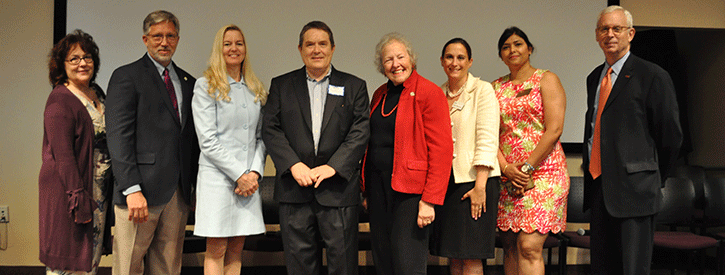
Cyber Training and Education Conference Organizers: (from left) Peggy Tadej, Director of Military Affairs for the Northern Virginia Regional Commission; Scott Ralls, President of Northern Virginia Community College; Liza Wilson Durant, Associate Dean Strategic Initiatives and Community Engagement George Mason Volgenau School of Engineering; William Rowe, Principle at Booz Allen and Hamilton; Fairfax County Board of Supervisors member Penny Gross; Olivia M. Blackmon, Director of Corporate Outreach and Special Projects, George Mason University Virginia Serious Game Institute; Kamaljeet Sanghera, Exec. Director, STEM Outreach for the George Mason Volgenau School of Engineering; and Robert Lazaro, Executive Director at the Northern Virginia Regional Commission.
Leaders from the business, academic, veterans, and local, state and federal government communities convened June 26 at the Cyber Training and Education Conference, held on the George Mason University Science and Technology campus in Manassas, Virginia. The conference’s purpose was to tackle a critical issue facing the region -- 43,200 vacant jobs in cyber technology waiting for workers.
Recognizing the exploding cyber technology marketplace and seeing the need and opportunity to meet that challenge -- via both traditional and alternative education and training methodologies – for area students as well as the burgeoning veteran’s population, conference organizers called together a wide range of stakeholders to outline a battle plan to meet that need.
Liza Wilson Durant, Associate Dean Strategic Initiatives and Community Engagement in the George Mason Volgenau School of Engineering, opened the conference by welcoming the attendees and reinforcing the critical need for properly trained employees of the future. “At Mason, we’re engaged in a sprint to develop new, and expand existing STEM programs to support the industry demand, but we simply cannot graduate students fast enough.”
Noting the importance of working together, Fairfax County Board of Supervisors member and Chair of the Community, Military and Federal Facility Partnership of Northern Virginia Penny Gross called for a team approach to workforce development in her remarks to conference goers.
Keynote speaker Scott Ralls, President of Northern Virginia Community College, told the audience that Northern Virginia is “ground zero for cybersecurity job openings… but we have to move much faster to fill them, with scale and speed.”
Hundreds of attendees filled the auditorium at the Mason Sci-Tech campus to learn more about the future of cyber technology. The conference offered two tracks – one for teachers interested in developing and delivering curriculum for K-12 students as well as for administrators at area institutions of higher education; the second for veterans interested in applying their skills learned in the armed services to the cyber technology field. Various panels throughout the conference discussed the ways and means to achieve the best outcome to pave pathways to cyber employment.
Peggy Tadej, Director of Military Affairs for the Northern Virginia Regional Commission, one of the sponsors of the event, noted “We need more partnering like this conference; we need everyone to join in and be part of the solution.”
Other sponsors included Prince William County, Northern Virginia Technology Council, Cisco, Booz Allen Hamilton, Northern Virginia Community College, Mason’s Game and Technology Academy, Mason’s Volgenau School of Engineering and Mason’s Serious Game Institute.
Olivia M. Blackmon, Director of Corporate Outreach and Special Projects at George Mason University Virginia Serious Game Institute, explained, “Our goal with this conference was to kick-start the effort to work collaboratively throughout the state -- streamlining the process for our students and our veterans to fill in the pipeline to meet the needs of our region’s employers. We’ve gotten off to a great start, but watch this space – there’s much more to come!”
To learn more about the conference, visit: www.vsgi.gmu.edu.
“At Mason, we’re engaged in a sprint to develop new, and expand existing STEM programs to support the industry demand, but we simply cannot graduate students fast enough.”
Liza Wilson Durant, Associate Dean for Strategic Initiatives and Community Engagement
